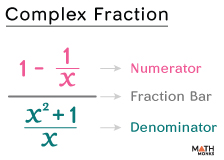A complex fraction is a rational expression with a fraction either in its numerator, denominator, or both. In other words, it is a fraction within a fraction.
Here are some more examples of complex fractions:
- ${\dfrac{1-\dfrac{1}{x}}{\dfrac{x^{2}+1}{x}}}$
- ${\dfrac{\dfrac{1}{a}}{a+\dfrac{1}{a}}}$
- ${\dfrac{\dfrac{1}{x+a}-\dfrac{1}{x+b}}{\dfrac{x+b}{x+a}+\dfrac{x+a}{x+b}}}$
Simplifying
There are two methods to simplify complex fractions.
By Division
Let us simplify the complex fraction ${\dfrac{1-\dfrac{1}{x}}{\dfrac{x^{2}+1}{x}}}$
Step 1: Rewriting as a Single Fraction
Writing the numerator and denominator as single fractions, we have
${\dfrac{1-\dfrac{1}{x}}{\dfrac{x^{2}+1}{x}}}$ = ${\dfrac{\dfrac{x-1}{x}}{\dfrac{x^{2}+1}{x}}}$
Step 2: Dividing the Numerator by the Denominator
Here, we multiply the numerator by the reciprocal of the denominator.
${\dfrac{\dfrac{x-1}{x}}{\dfrac{x^{2}+1}{x}}}$
= ${\dfrac{x-1}{x}\times \dfrac{x}{x^{2}+1}}$
Step 3: Simplifying (If Required)
= ${\dfrac{x-1}{x^{2}+1}}$, which is already in the simplified or reduced form.
Thus, ${\dfrac{1-\dfrac{1}{x}}{\dfrac{x^{2}+1}{x}}}$ is simplified to ${\dfrac{x-1}{x^{2}+1}}$
Multiplying by a Common Denominator
Let us now simplify the complex fraction ${\dfrac{\dfrac{3}{x-1}-4}{2-\dfrac{2}{x-1}}}$ by the common denominator method.
Step 1: Finding the Least Common Denominator (LCD) for All Fractions Within the Complex Fraction
The LCD is (x – 1)
Step 2: Multiplying the Numerator and Denominator of the Complex Fraction by the LCD
Now, we have
${\dfrac{\dfrac{3}{x-1}-4}{2-\dfrac{2}{x-1}}}$
= ${\dfrac{\left( x-1\right) \left( \dfrac{3}{x-1}-4\right) }{\left( x-1\right) \left( 2-\dfrac{2}{x-1}\right) }}$
= ${\dfrac{\left( x-1\right) \left( \dfrac{3}{x-1}\right) -4\left( x-1\right) }{2\left( x-1\right) -\left( x-1\right) \left( \dfrac{2}{x-1}\right) }}$
Step 3: Simplifying (If Required)
= ${\dfrac{3-4x+4}{2x-2-2}}$
= ${\dfrac{7-4x}{2x-4}}$
= ${\dfrac{7-4x}{2\left( x-2\right) }}$
Thus, ${\dfrac{\dfrac{3}{x-1}-4}{2-\dfrac{2}{x-1}}}$ is simplified to ${\dfrac{7-4x}{2\left( x-2\right) }}$
Solved Examples
![]() Simplify by division method: ${\dfrac{1-\dfrac{1}{x}}{2}}$
Simplify by division method: ${\dfrac{1-\dfrac{1}{x}}{2}}$
Solution:
![]()
Here, ${\dfrac{1-\dfrac{1}{x}}{2}}$
= ${\dfrac{\dfrac{x-1}{x}}{2}}$
= ${\dfrac{x-1}{x}\times \dfrac{1}{2}}$
= ${\dfrac{x-1}{2x}}$
Thus, ${\dfrac{1-\dfrac{1}{x}}{2}}$ is simplified to ${\dfrac{x-1}{2x}}$
![]() Simplify by division method: ${\dfrac{1+\dfrac{1}{y}}{1-\dfrac{1}{y}}}$
Simplify by division method: ${\dfrac{1+\dfrac{1}{y}}{1-\dfrac{1}{y}}}$
Solution:
![]()
Here, ${\dfrac{1+\dfrac{1}{y}}{1-\dfrac{1}{y}}}$
= ${\dfrac{\dfrac{y+1}{y}}{\dfrac{y-1}{y}}}$
= ${\dfrac{y+1}{y}\times \dfrac{y}{y-1}}$
= ${\dfrac{y+1}{y-1}}$
Thus, ${\dfrac{1+\dfrac{1}{y}}{1-\dfrac{1}{y}}}$ is simplified to ${\dfrac{y+1}{y-1}}$
![]() Simplify the complex fraction by division method: ${\dfrac{\dfrac{4}{x+3}}{\dfrac{1}{x}+3}}$
Simplify the complex fraction by division method: ${\dfrac{\dfrac{4}{x+3}}{\dfrac{1}{x}+3}}$
Solution:
![]()
Here, ${\dfrac{\dfrac{4}{x+3}}{\dfrac{1}{x}+3}}$
= ${\dfrac{\dfrac{4}{x+3}}{\dfrac{1+3x}{x}}}$
= ${\dfrac{4}{x+3}\times \dfrac{x}{1+3x}}$
= ${\dfrac{4x}{\left( x+3\right) \left( 1+3x\right) }}$
Thus, ${\dfrac{\dfrac{4}{x+3}}{\dfrac{1}{x}+3}}$ is simplified to ${\dfrac{4x}{\left( x+3\right) \left( 1+3x\right) }}$
![]() Simplify by the common denominator method: ${\dfrac{\dfrac{2}{x}-\dfrac{4}{y}}{\dfrac{-5}{y}+\dfrac{3}{x}}}$
Simplify by the common denominator method: ${\dfrac{\dfrac{2}{x}-\dfrac{4}{y}}{\dfrac{-5}{y}+\dfrac{3}{x}}}$
Solution:
![]()
Here, ${\dfrac{\dfrac{2}{x}-\dfrac{4}{y}}{\dfrac{-5}{y}+\dfrac{3}{x}}}$
= ${\begin{aligned}xy\left( \dfrac{2}{x}-\dfrac{4}{y}\right) \\ \dfrac{}{xy\left( \dfrac{-5}{y}+\dfrac{3}{x}\right) }\end{aligned}}$
= ${\dfrac{xy\left( \dfrac{2}{x}\right) -xy\left( \dfrac{4}{y}\right) }{xy\left( \dfrac{-5}{y}\right) +xy\left( \dfrac{3}{x}\right) }}$
= ${\dfrac{2y-4x}{-5x+3y}}$
= ${\dfrac{2\left( y-2x\right) }{3y-5x}}$
Thus, ${\dfrac{\dfrac{2}{x}-\dfrac{4}{y}}{\dfrac{-5}{y}+\dfrac{3}{x}}}$ is simplified to ${\dfrac{2\left( y-2x\right) }{3y-5x}}$
![]() Simplify by the common denominator method: ${\dfrac{2-\dfrac{1}{y}}{3+\dfrac{1}{y}}}$
Simplify by the common denominator method: ${\dfrac{2-\dfrac{1}{y}}{3+\dfrac{1}{y}}}$
Solution:
![]()
Here, ${\dfrac{2-\dfrac{1}{y}}{3+\dfrac{1}{y}}}$
= ${\dfrac{y\left( 2-\dfrac{1}{y}\right) }{y\left( 3+\dfrac{1}{y}\right) }}$
= ${\dfrac{2y-y\times \dfrac{1}{y}}{3y+y\times \dfrac{1}{y}}}$
= ${\dfrac{2y-1}{3y+1}}$
Thus, ${\dfrac{2-\dfrac{1}{y}}{3+\dfrac{1}{y}}}$ is simplified to $${\dfrac{2y-1}{3y+1}}$
![]() Reduce the complex fraction by the common denominator method: ${\dfrac{\dfrac{2}{5t}-\dfrac{3}{3t}}{\dfrac{1}{2t}+\dfrac{1}{2t}}}$
Reduce the complex fraction by the common denominator method: ${\dfrac{\dfrac{2}{5t}-\dfrac{3}{3t}}{\dfrac{1}{2t}+\dfrac{1}{2t}}}$
Solution:
![]()
Here, ${\dfrac{\dfrac{2}{5t}-\dfrac{3}{3t}}{\dfrac{1}{2t}+\dfrac{1}{2t}}}$
= ${\dfrac{30t\left( \dfrac{2}{5t}-\dfrac{3}{3t}\right) }{30t\left( \dfrac{1}{2t}+\dfrac{1}{2t}\right) }}$
= ${\dfrac{30t\left( \dfrac{2}{5t}\right) -30t\left( \dfrac{3}{3t}\right) }{30t\left( \dfrac{1}{2t}\right) +30t\left( \dfrac{1}{2t}\right) }}$
= ${\dfrac{12-30}{15+15}}$
= ${\dfrac{-18}{30}}$
= ${\dfrac{-3}{5}}$
![]() Which expression is equivalent to the complex fraction ${\dfrac{\dfrac{x}{x+3}}{\dfrac{1}{x}+\dfrac{1}{x+3}}}$
Which expression is equivalent to the complex fraction ${\dfrac{\dfrac{x}{x+3}}{\dfrac{1}{x}+\dfrac{1}{x+3}}}$
a) ${\dfrac{x^{2}+2x+3}{2x+3}}$
b) ${\dfrac{x^{2}}{2x+3}}$
c) ${\dfrac{x^{2}}{x+3}}$
d) ${\dfrac{x^{2}}{2x}}$
Solution:
![]()
Here, option b) is equivalent to the complex fraction ${\dfrac{\dfrac{x}{x+3}}{\dfrac{1}{x}+\dfrac{1}{x+3}}}$

